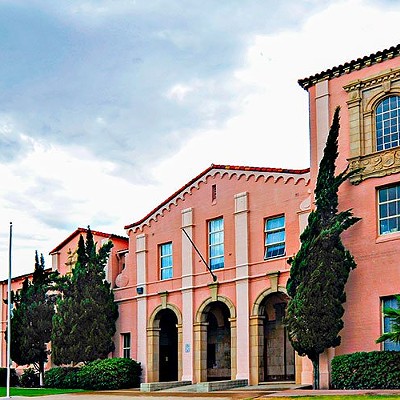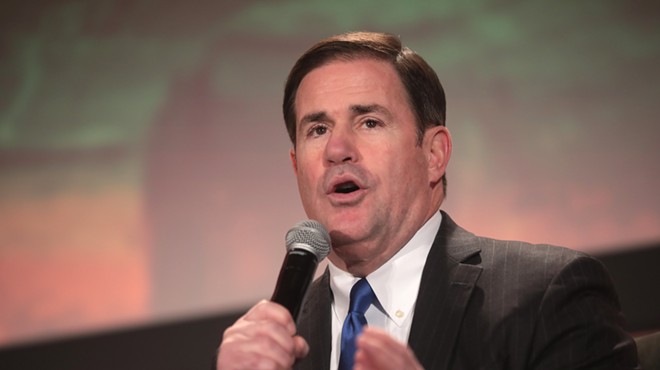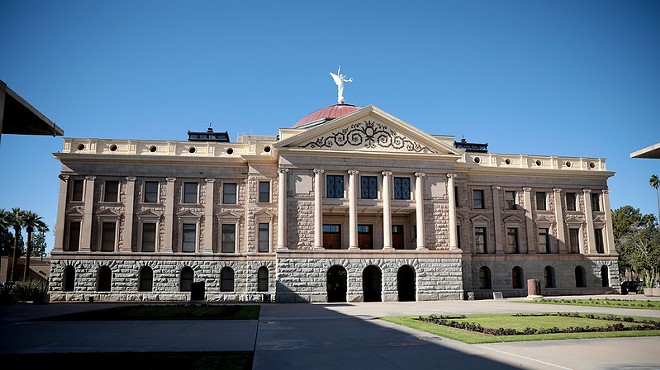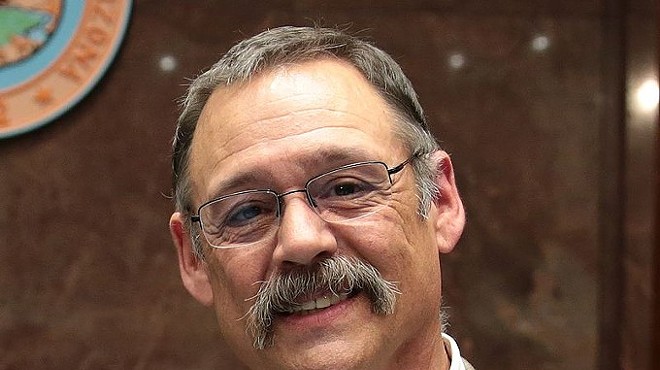Monday, July 18, 2016
Another Look at TUSD Salary Hikes and Prop 123
A few weeks ago I wrote a post trying to sort out what looked like contradictory information about the amount of Prop 123 money TUSD devoted to teacher salary raises. An article in the Star made it look like TUSD devoted far less of the new funding to increasing teacher salaries—about a third of the money, which amounted to a $700 raise—than neighboring districts, which would mean TUSD was shortchanging its teachers. But the article also mentioned the possibility that the district had found other ways to increase salaries. Meanwhile, the TUSD website states that returning teachers will make $2,000 more in 2016-17 than they made in the previous year. I ended the post by scratching my head and admitting I didn't know how to figure out the actual pay raises based on the information I had.
Since then, more has been written on the subject, and the pay raise situation is clearer. Here's the short version: As the TUSD website states, returning teachers will get a $2,000 raise over the previous year, which is in the same ballpark as neighboring districts. That's because, at the May 10 school board meeting a week before the Prop 123 vote, the board approved a $1,300 teacher raise. After Prop 123 passed, $700 was added to that amount, resulting in a $2,000 raise. Other Tucson-area districts created a variety of salary raise and retention incentive bonus packages, some of which are a bit more generous, and some a bit less generous, than TUSD's.
Here's the longer version, which I believe is accurate. If I've got my facts or numbers wrong, I'm sure people will let me know in the comments section.
At TUSD's May 10, 2016, board meeting, a salary raise was approved. It increased the pay for each salary step by $800, and since returning teachers move up a step which adds another $500, the total increase for returning teachers was $1,300. Since Prop 123 hadn't come up for a vote, the money for the raises was taken from maintenance and operations funds as well as Prop 301 funds. The $1,300 salary increase was guaranteed whether Prop 123 went up or down.
I spoke with Superintendent H.T. Sanchez, and he explained his reasoning behind the pre-Prop 123 raise. In the weeks before the election, the polling numbers on 123 were very close. It was pretty much even money whether it would pass or fail, and if it was defeated, there would be no additional funding to spend on salary hikes. TUSD created the May 10 increase as an assurance to returning TUSD teachers that they were guaranteed a $1,300 increase regardless of the vote outcome. I don't know of any other district in the area that made a similar guarantee to its teachers before the Prop 123 vote.
Generally, a contract is a contract and employees have no reason to expect any more salary increases that year, but this contract indicated that if Prop 123 passed, it was likely the district would increase teacher salaries again. Here is the language in 29-5, Part E:
The Star article I discussed in my earlier post created the impression that TUSD reneged on its pledge to use the Prop 123 funds for salary hikes and instead spent two-thirds of the money on capital items. While that's factually accurate, it's only part of the story, and it's very misleading. In fact, on May 10, TUSD took money out of its capital funds to give teachers a raise regardless of the fate of Prop 123. When the proposition passed, the district was able to give back the capital funds money it took away. The final result was the same $2,000 raise the district would have given the teachers after the Prop 123 vote if it waited instead of giving most of the raise earlier. The only difference was, TUSD guaranteed a teacher raise even if the proposition failed.
If the district waited like other districts and took the entire $2,000 out of its Prop 123 funds, it would have amounted to 75 percent of the total. When you add in the pay raises for classified staff and administrators, 86 percent of the new funds, about $8.3 million of the $9.7 million, went to salary hikes.
The $2,000 raise amounts to a 4 to 5 percent increase depending on where a teacher is on the salary schedule. I looked at the information at the end of the Star article and compared that to what other districts gave their teachers. Amphitheater district gave its employees a 3.6 percent raise, which is less than TUSD, but it also gave its returning teachers retention incentive that was 3 percent of their previous year's salary. I'll leave it to better mathematical minds than mine to figure out the advantages and disadvantages of receiving a one-time bonus combined with a smaller salary increase compared to receiving no bonus and a larger raise that continues at the higher rate year after year.
Catalina Foothills gave teachers a 4.5 percent raise. Flowing Wells gave teachers a 3.3 percent retention incentive, then raised teachers salaries between $1,000 and $2,400 depending on their years of experience. Other districts have similar pay packages.
My conclusion is, the Star article was reasonably accurate factually but incomplete. Because it left out TUSD's May 10 teacher raise, its conclusion that TUSD reneged on its pledge to its teachers is inaccurate. If the writer had looked at the comparison of pay raises at TUSD and other districts more carefully, there would have been no story to report, let alone a front page story critical of TUSD. The TUSD salary package is similar to what teachers are receiving in neighboring districts. Teachers come out better or worse in different districts depending on how much experience they have and how long they plan to continue working for the district. TUSD's decision to put all its money into the salary schedule, rather than putting some of it into one time bonuses for returning teachers as most other districts did, could mean that new teachers will fare better at TUSD than elsewhere, which could be a benefit for TUSD when it comes to hiring.
A "$500-Question" Note: Let me include one point for the sake of completeness. I'm reasonably comfortable that my discussion of TUSD raises and how they compare with other districts is accurate, except for one point where I'm uncertain. The $2,000 figure for TUSD includes $500 for moving up a year in experience. If other districts also included their normal step raises in figuring the increase in teacher salaries, then my comparisons are valid. If, on the other hand, other districts give their teachers step raises but didn't include them in their calculations, that would change things.
Since then, more has been written on the subject, and the pay raise situation is clearer. Here's the short version: As the TUSD website states, returning teachers will get a $2,000 raise over the previous year, which is in the same ballpark as neighboring districts. That's because, at the May 10 school board meeting a week before the Prop 123 vote, the board approved a $1,300 teacher raise. After Prop 123 passed, $700 was added to that amount, resulting in a $2,000 raise. Other Tucson-area districts created a variety of salary raise and retention incentive bonus packages, some of which are a bit more generous, and some a bit less generous, than TUSD's.
Here's the longer version, which I believe is accurate. If I've got my facts or numbers wrong, I'm sure people will let me know in the comments section.
At TUSD's May 10, 2016, board meeting, a salary raise was approved. It increased the pay for each salary step by $800, and since returning teachers move up a step which adds another $500, the total increase for returning teachers was $1,300. Since Prop 123 hadn't come up for a vote, the money for the raises was taken from maintenance and operations funds as well as Prop 301 funds. The $1,300 salary increase was guaranteed whether Prop 123 went up or down.
I spoke with Superintendent H.T. Sanchez, and he explained his reasoning behind the pre-Prop 123 raise. In the weeks before the election, the polling numbers on 123 were very close. It was pretty much even money whether it would pass or fail, and if it was defeated, there would be no additional funding to spend on salary hikes. TUSD created the May 10 increase as an assurance to returning TUSD teachers that they were guaranteed a $1,300 increase regardless of the vote outcome. I don't know of any other district in the area that made a similar guarantee to its teachers before the Prop 123 vote.
Generally, a contract is a contract and employees have no reason to expect any more salary increases that year, but this contract indicated that if Prop 123 passed, it was likely the district would increase teacher salaries again. Here is the language in 29-5, Part E:
For the 2016-2017 year only, if additional revenues become available to the District through legislative appropriation, state sales tax revenues, payment of back revenue or inflation adjustment owed by the State of Arizona, decrease in anticipated cuts or decrease in revenue drop, or other legal enactment and if those revenues are appropriated, authorized, and/or permitted to be used for salaries during the 2015-2016 and/or the 2016-2017 contract year, the MBU may be given a raise in salary, if so approved by the Governing Board in its sole discretion.That passage made it clear the district wasn't planning to shortchange the teachers by giving them a raise before the Prop 123 vote. And when the proposition passed, the Board added $700 to the $1,300 in the contract, making it a $2,000 raise.
The Star article I discussed in my earlier post created the impression that TUSD reneged on its pledge to use the Prop 123 funds for salary hikes and instead spent two-thirds of the money on capital items. While that's factually accurate, it's only part of the story, and it's very misleading. In fact, on May 10, TUSD took money out of its capital funds to give teachers a raise regardless of the fate of Prop 123. When the proposition passed, the district was able to give back the capital funds money it took away. The final result was the same $2,000 raise the district would have given the teachers after the Prop 123 vote if it waited instead of giving most of the raise earlier. The only difference was, TUSD guaranteed a teacher raise even if the proposition failed.
If the district waited like other districts and took the entire $2,000 out of its Prop 123 funds, it would have amounted to 75 percent of the total. When you add in the pay raises for classified staff and administrators, 86 percent of the new funds, about $8.3 million of the $9.7 million, went to salary hikes.
The $2,000 raise amounts to a 4 to 5 percent increase depending on where a teacher is on the salary schedule. I looked at the information at the end of the Star article and compared that to what other districts gave their teachers. Amphitheater district gave its employees a 3.6 percent raise, which is less than TUSD, but it also gave its returning teachers retention incentive that was 3 percent of their previous year's salary. I'll leave it to better mathematical minds than mine to figure out the advantages and disadvantages of receiving a one-time bonus combined with a smaller salary increase compared to receiving no bonus and a larger raise that continues at the higher rate year after year.
Catalina Foothills gave teachers a 4.5 percent raise. Flowing Wells gave teachers a 3.3 percent retention incentive, then raised teachers salaries between $1,000 and $2,400 depending on their years of experience. Other districts have similar pay packages.
My conclusion is, the Star article was reasonably accurate factually but incomplete. Because it left out TUSD's May 10 teacher raise, its conclusion that TUSD reneged on its pledge to its teachers is inaccurate. If the writer had looked at the comparison of pay raises at TUSD and other districts more carefully, there would have been no story to report, let alone a front page story critical of TUSD. The TUSD salary package is similar to what teachers are receiving in neighboring districts. Teachers come out better or worse in different districts depending on how much experience they have and how long they plan to continue working for the district. TUSD's decision to put all its money into the salary schedule, rather than putting some of it into one time bonuses for returning teachers as most other districts did, could mean that new teachers will fare better at TUSD than elsewhere, which could be a benefit for TUSD when it comes to hiring.
A "$500-Question" Note: Let me include one point for the sake of completeness. I'm reasonably comfortable that my discussion of TUSD raises and how they compare with other districts is accurate, except for one point where I'm uncertain. The $2,000 figure for TUSD includes $500 for moving up a year in experience. If other districts also included their normal step raises in figuring the increase in teacher salaries, then my comparisons are valid. If, on the other hand, other districts give their teachers step raises but didn't include them in their calculations, that would change things.
Tags: Tucson Unified School District , Prop 123 , Prop 301 , Teacher raises , Superintendent H.T. Sanchez














